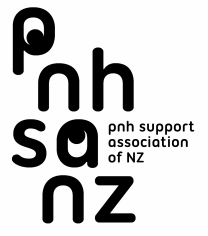The Faces of PNH in New Zealand
Although PNH is an ultra-rare disease it touches the lives of many New Zealanders, with patients, friends, family and health specialists throughout the country. These are the stories of those directly and indirectly affected by the disease.
Dion - 27, ChristchurchDion speaks about why the only rational response to illness is compassion.
|
Daniel - 32, AucklandDaniel delivers a plea to PHARMAC - please preserve my life!
|
Andrea - 52, DunedinAndrea discusses the serious health problems caused by PNH and the "wonder" drug that is Soliris.
|
Natalie - 32, MatamataNatalie talks about the difficulty of living with an unpredictable, ultra-rare disease.
|
Wendy - 59, Palmerston NorthWendy explains why she is so prepared to fight for her daughter's health.
|
Grace - 11, Auckland

The following story comes from the mother of Grace, an 11yo PNH patient living in Auckland.
My beautiful and talented daughter Grace, 11, was diagnosed with Paroxysmal Nocturnal Haemoglobinuria (PNH), an ultra rare blood disease, just before her ninth birthday.
Grace, who works hard at school, is a high achiever and if given the chance, will grow up to be an amazing young woman. She deserves a full and rewarding life like everyone else.
PNH is a debilitating blood disease that causes red blood cells to explode. If not treated, the disease can cause pain, fatigue, permanent kidney damage, life threatening blood clots and an overall poor quality of life.
Devastatingly, Soliris (eculizumab), the only effective treatment for preventing the life threatening consquences of PNH is currently not funded in New Zealand - a decision which rests in the hands of PHARMAC.
Grace has been living with PNH for just over two years and has a 90 per cent PNH clone size. She was initially screened for a bone marrow transplant but no suitable match was found. After consulting with a UK based PNH specialist, her haematologist confirmed that the risks for a bone marrow transplant were too great.
Our family is forever grateful to the wonderful team of dedicated health professionals who look after Grace. The doctors and nurses at Starship Hospital’s Haematology and Oncology department who care for her have been absolutely amazing.
At the beginning of 2012, we had the opportunity to attend a meeting for New Zealanders living with PNH. Dr Richard Kelly, a PNH expert from Leeds, UK, gave us a fantastic overview of PNH and current management of the disease. For Grace, it was fantastic to make contact with other people who have PNH. Knowing there are others living with, or supporting those with this disease is a great support to all of us.
Since her diagnosis, Grace has learned to adjust her activities according to how PNH is affecting her. The unpredictable nature of the disease can make it difficult to manage. One moment she can be fine and the next, seriously unwell.
It breaks my heart to think of what she will have to cope with in her life and I worry about her future. For Grace, the mildest cold or sniffle causes a hemolytic crisis, involving the rapid destruction of red blood cells. Grace has needed blood transfusions and frequently experiences extreme fatigue, abdominal cramps and swallowing problems that limit her ability to enjoy life. Over time, the chronic hemolysis (red blood cells exploding) will cause permanent damage to Grace’s kidneys.
Soliris is the only available treatment that can protect her kidneys from damage, stop the development of the deadly blood clots, and eliminate the need for blood transfusions. It terrifies me to know that this life-saving treatment is not available to Grace should she need it in the future.
Due to the rare disease status of PNH, with only a handful of New Zealand patients living with the disease, funding of Soliris has been overlooked.
I have met three PNH patients living in New Zealand receiving Soliris via the manufacturer’s temporary compassionate use program – in the words of these patients, the improvements with the treatment are nothing short of miraculous.
Our Government has an obligation to provide for the welfare of all New Zealanders. An effective treatment is available for the disease and it should be accessible to all PNH patients. Funding MUST be approved for this life saving treatment.
Ruth (Grace’s mother)
My beautiful and talented daughter Grace, 11, was diagnosed with Paroxysmal Nocturnal Haemoglobinuria (PNH), an ultra rare blood disease, just before her ninth birthday.
Grace, who works hard at school, is a high achiever and if given the chance, will grow up to be an amazing young woman. She deserves a full and rewarding life like everyone else.
PNH is a debilitating blood disease that causes red blood cells to explode. If not treated, the disease can cause pain, fatigue, permanent kidney damage, life threatening blood clots and an overall poor quality of life.
Devastatingly, Soliris (eculizumab), the only effective treatment for preventing the life threatening consquences of PNH is currently not funded in New Zealand - a decision which rests in the hands of PHARMAC.
Grace has been living with PNH for just over two years and has a 90 per cent PNH clone size. She was initially screened for a bone marrow transplant but no suitable match was found. After consulting with a UK based PNH specialist, her haematologist confirmed that the risks for a bone marrow transplant were too great.
Our family is forever grateful to the wonderful team of dedicated health professionals who look after Grace. The doctors and nurses at Starship Hospital’s Haematology and Oncology department who care for her have been absolutely amazing.
At the beginning of 2012, we had the opportunity to attend a meeting for New Zealanders living with PNH. Dr Richard Kelly, a PNH expert from Leeds, UK, gave us a fantastic overview of PNH and current management of the disease. For Grace, it was fantastic to make contact with other people who have PNH. Knowing there are others living with, or supporting those with this disease is a great support to all of us.
Since her diagnosis, Grace has learned to adjust her activities according to how PNH is affecting her. The unpredictable nature of the disease can make it difficult to manage. One moment she can be fine and the next, seriously unwell.
It breaks my heart to think of what she will have to cope with in her life and I worry about her future. For Grace, the mildest cold or sniffle causes a hemolytic crisis, involving the rapid destruction of red blood cells. Grace has needed blood transfusions and frequently experiences extreme fatigue, abdominal cramps and swallowing problems that limit her ability to enjoy life. Over time, the chronic hemolysis (red blood cells exploding) will cause permanent damage to Grace’s kidneys.
Soliris is the only available treatment that can protect her kidneys from damage, stop the development of the deadly blood clots, and eliminate the need for blood transfusions. It terrifies me to know that this life-saving treatment is not available to Grace should she need it in the future.
Due to the rare disease status of PNH, with only a handful of New Zealand patients living with the disease, funding of Soliris has been overlooked.
I have met three PNH patients living in New Zealand receiving Soliris via the manufacturer’s temporary compassionate use program – in the words of these patients, the improvements with the treatment are nothing short of miraculous.
Our Government has an obligation to provide for the welfare of all New Zealanders. An effective treatment is available for the disease and it should be accessible to all PNH patients. Funding MUST be approved for this life saving treatment.
Ruth (Grace’s mother)

